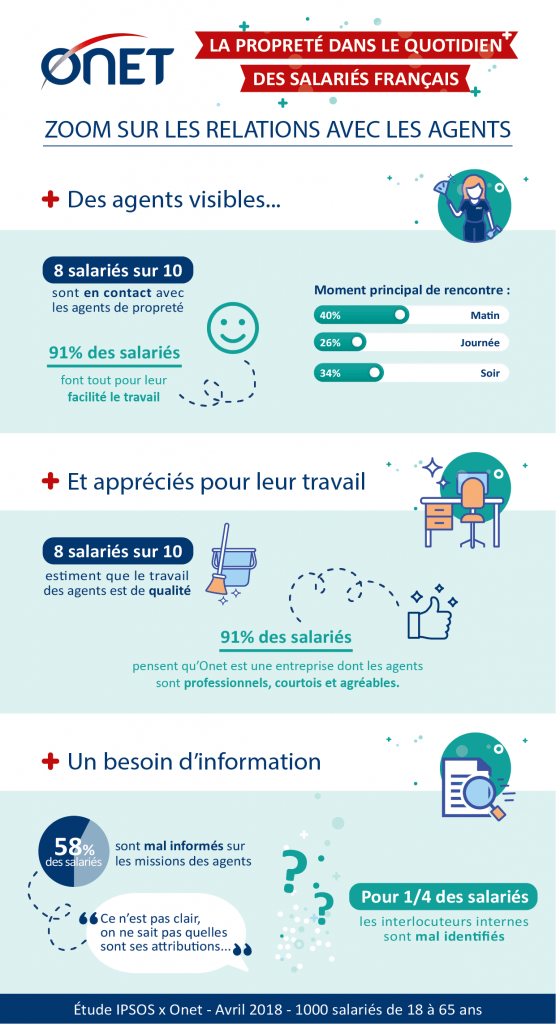Cleanliness in the daily lives of French employees: focus on relations with cleaners
As a key player in maintaining cleanliness, the maintenance worker is often viewed with benevolence.
Nevertheless, their missions are not always known by the employees of the companies in which they work.
- - Onet Cleaning and Associated Services
How important is cleanliness in the daily lives of French employees?
Cleanliness is a fundamental issue in the daily lives of French employees. However, the subject is not very visible in the public debate. This is why Onet decided to commission IPSOS to carry out a study* on the subject. The aim was to measure the importance of cleanliness for French employees and its impact on their well-being and motivation at work.
Key findings of the IPSOS x Onet survey
In this study, cleanliness proved to be a genuine source of well-being and a real performance driver. Indeed, 94% of French employees consider that hygiene and cleanliness help maintain a good atmosphere in the office, and 93% even feel more motivated when common areas are clean and tidy.
On the other hand, its absence is a source of conflict for one in two employees, a result exacerbated in the flex office, where the proportion of employees who have experienced conflict rises to 62%.
Finally, while cleanliness is indeed the employer's responsibility for 86% of employees, 95% of those surveyed feel that it is everyone's responsibility to keep the workplace clean, especially the employees themselves. 8 out of 10 employees even agree with the idea of penalizing incivilities relating to hygiene and cleanliness in the workplace.
Focus on agent relations

The IPSOS-Onet survey reveals that 86% of employees work with cleaners, who are appreciated for their work and discretion. They are most often polite to each other, and are particularly friendly towards them.
On the other hand, we note a lack of information on the part of employees, which can create delicate situations and lead to misunderstandings and conflicts.
"We can't ask them to do everything, we can't overload them.
It's not our place, it's more up to the employer to say so."
To meet both the challenges of clients and the expectations of their occupants, Onet naturally places the well-being of users - whether employees, customers or visitors - at the heart of its solutions. Numerous tools have been developed to better understand occupants' expectations, encourage them to discuss hygiene and cleanliness, and thus improve their well-being.
Examples of solutions: the cleanliness quiz, posters to share, daytime working, connected washrooms, etc.
To find out more about Onet solutions: https://www.lapropretecestfondamental.com/les-solutions-onet/
* Onet x IPSOS survey of 1,000 French employees aged 18 to 65 on the place of cleanliness in their daily lives.




